💬 NModule
-
This looks like an excellent project. In the end i'm not sure which is easier and faster: unsoldering parts from a pro mini or soldering an atmega328p and a few parts onto a pcb. I suppose a pro mini is less expensive though in small volume. For me, since I burn the latest optiboot, the dip chip seems maybe slightly easier to setup.
Having a bunch of pre_made shields, though, is a definite time saver. This project should, justifiably, appeal to a lot of people.
Fantastic!
By the way, for those who don't already know, ChipQuik is a great aid in unsoldering parts from a Pro Mini: https://www.amazon.com/ChipQuik-SMD1-Leaded-Temperature-Removal/dp/B0019UZP7I/ref=sr_1_sc_1?ie=UTF8&qid=1495997244&sr=8-1-spell&keywords=chipqwik
I use it all the time whenever I need to unsolder SMD parts. -
This looks like an excellent project. In the end i'm not sure which is easier and faster: unsoldering parts from a pro mini or soldering an atmega328p and a few parts onto a pcb. I suppose a pro mini is less expensive though in small volume. For me, since I burn the latest optiboot, the dip chip seems maybe slightly easier to setup.
Having a bunch of pre_made shields, though, is a definite time saver. This project should, justifiably, appeal to a lot of people.
Fantastic!
@NeverDie thank you !
I agree about the SMD atmega it's quicker to solder than all the pins on the ProMini, but if you take the full process including the 2 or 3 extra caps, pullup resistor for RST, cleaning the flux, checking you didn't make any shortcuts between those tiny pins etc etc I think it's faster with the ProMini as it's pretty hard to miss a through-hole solder point and removing 2 leds and regulator is less than one minute for me even with bad eyes and short term experience only with SMD.About ChipQuik I find it expensive, it seems cheaper to fail on a less-than-2$ ProMini once in a while :D
And for max efficiency there's the hot air gun, I have a cheap one (65€ I think, express delivery included) but it's still magic enough to bring the time to only a few seconds per board when you process a bunch at the same time.
-
@NeverDie thank you !
I agree about the SMD atmega it's quicker to solder than all the pins on the ProMini, but if you take the full process including the 2 or 3 extra caps, pullup resistor for RST, cleaning the flux, checking you didn't make any shortcuts between those tiny pins etc etc I think it's faster with the ProMini as it's pretty hard to miss a through-hole solder point and removing 2 leds and regulator is less than one minute for me even with bad eyes and short term experience only with SMD.About ChipQuik I find it expensive, it seems cheaper to fail on a less-than-2$ ProMini once in a while :D
And for max efficiency there's the hot air gun, I have a cheap one (65€ I think, express delivery included) but it's still magic enough to bring the time to only a few seconds per board when you process a bunch at the same time.
I'll give the hot air gun a try. Thanks for the suggestion!
I hadn't realized that the PCB for this project is as big as it is until I went to order one from Osh Park just now. They want $18.85 for three. Maybe you can post a version with just the core pro mini shield but with the battery related part and the antenna silkscreen amputated? That would reduce the PCB cost by a lot. I haven't delved into it, so sorry in advance if perhaps the question is overly simplistic. I'm guessing there may be others like me who want to try it and who have alternate ways of powering it.
-
I'll give the hot air gun a try. Thanks for the suggestion!
I hadn't realized that the PCB for this project is as big as it is until I went to order one from Osh Park just now. They want $18.85 for three. Maybe you can post a version with just the core pro mini shield but with the battery related part and the antenna silkscreen amputated? That would reduce the PCB cost by a lot. I haven't delved into it, so sorry in advance if perhaps the question is overly simplistic. I'm guessing there may be others like me who want to try it and who have alternate ways of powering it.
@NeverDie yes that's how it was not so long ago, that's why it's small like that on the pictures I didn't have the battery/power part nor antenna support.
I'm more used to Seeed, DirtyPCB, Elecrow and PCBWay so size doesn't matter if you stay below 55cm or 1010cm.I added the small part below antenna because with previous version I had a case when I unsoldered the radio module during manipulation. But I get the point it's not worth it if you pay board per surface.
It's easy to make so I'll add NModule_Core.xxx gerber files ASAP. -
Thanks! I just now ordered it:
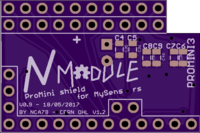
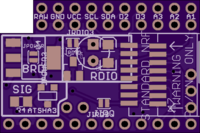
$4.80 is a lot better than $18.85. :) -
Christmas in June ! :D
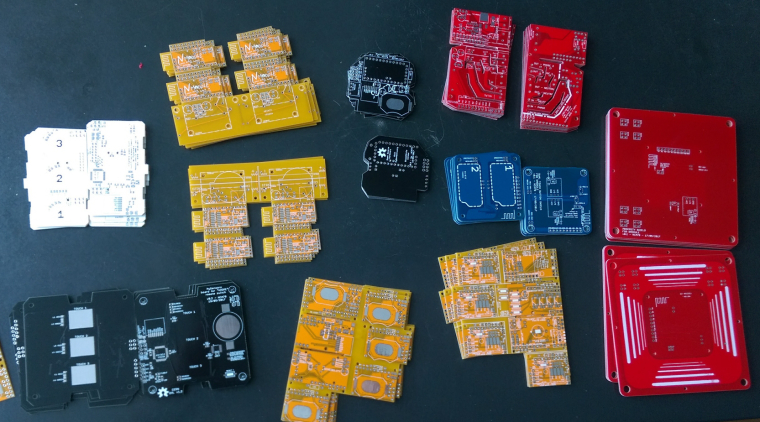
-
NModule works with 3.3V power from header/programmer, and with a coin cell on the "power" board attached to it (tested with CR2025 and 220µF electrolytic capacitor).
I'll continue the tests tomorrow.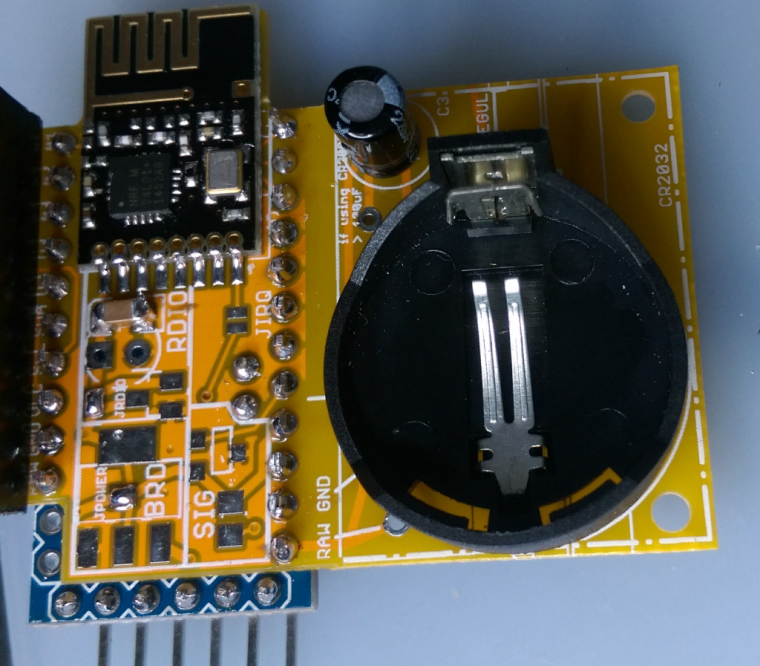
-
Not a big deal, but the silkscreen printing is jumbled together, making it hard to read:
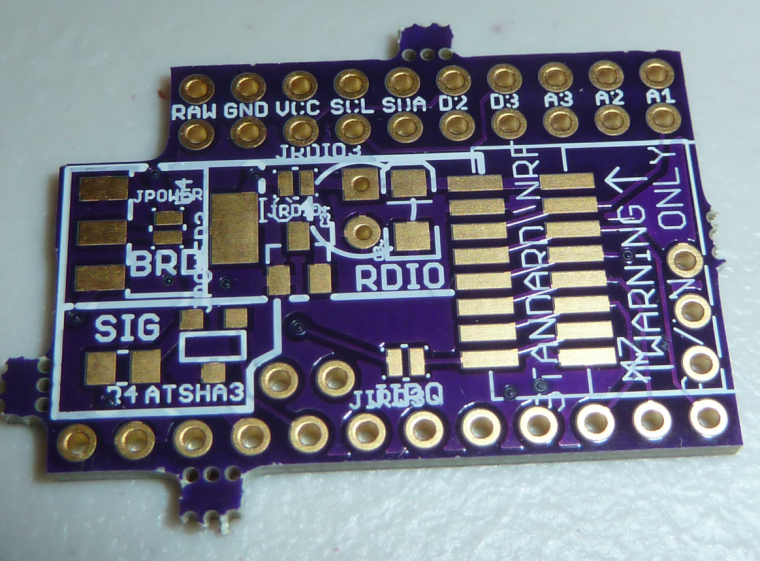
Not sure if you're seeing it on your boards that way or not, but that's how OSH PARK did it.
-
Also, there are a number of "Pro Mini" type boards on the marketplace, and not all of them are 100% pin compatible. Which did you choose as your model? Is it the Sparkfun Pro Mini (which, if I'm not mistaken, was the first and the root of it all)? You may want to show a photo of the pro mini you're assuming along with a caption reading "your pro mini should look like this" just to avoid confusion.
-
I think you're the first to ever have a board made by myself in your hands. Congratulations :D
For the PCB it's probably due to a mistake from me when modifying the board to make the "core" Gerber version or when exporting files. I will have a look and fix asap.
For the ProMini I mainly use "The Simple" version from AliExpress, but my local seller has some "Sparkfun" branded clones and they are fine too.
You should only solder the connectors on the long sides and A4+A5. If it's not clear enough when reading assembly process please tell me.
Both types of ProMinis have the same layout for side pins and A4/A5, only the programming header and A6/A7 pins are different so it has no importance for NModule. -
I have used Seeed PCB service a few times in the past. They are not quite the cheapest but still excellent value, and for that little bit extra they do a better job than most.
-
Wow. $4.90 sounds great. What's their total turnaround time, including delivery? Actual delivery time, not just advertised delivery time, I mean.
-
Wow. $4.90 sounds great. What's their total turnaround time, including delivery? Actual delivery time, not just advertised delivery time, I mean.
-
for best battery life it is advisable to burn bootloader mentioned in the text.
How much would a battery lifetime be, for example one single temp sensor reading every 5min?
When using custom bootloader, then over the air updates cannot be used? Or could the MYSBootloader be configured to take most of the cr2025 battery? -
for best battery life it is advisable to burn bootloader mentioned in the text.
How much would a battery lifetime be, for example one single temp sensor reading every 5min?
When using custom bootloader, then over the air updates cannot be used? Or could the MYSBootloader be configured to take most of the cr2025 battery?Hello @dakipro,
what is necessary is to remove the default BOD limit, it is set at 2.7V and that is too high :
- even if CRxxxx cells were running like alkaline cells, this would waste a big share of the capacity, around 30% I think
- CRxxxx are not like alkaline cells, they have a high internal resistance and can supply only a limited amount of current, else the voltage drops. Meaning that in fact you will reach this 2.7V much faster if you have several RX/TX in a row
That is the main limit. I also advise to change the frequency to 1MHz and use internal oscillator if you have no calculation to do: door sensor, all basic I2C sensors etc etc because at 1MHz the power consumption is significantly lower. With NRF24 and I2C sensors it will not slow the "on" time much, data sent to/from radio and sensors takes very little time to transfer and main time is for waiting for radio reply or data from sensor: not affected by frequency so better have consumption as little as possible.
For battery lifetime if you remove leds and regulators with si7021 it will be way over 1 year. I have not tested those sensors for long enough, but I've had some round "puck" sensors with si7021 running for a few months on chinese CR2032 and I have not seen any voltage drop. Interval time is set to 1mn, it's not sending 5x more than 5mn interval (because often in one minute temp/hum don't change) but probably 2-3 times more, and with that I have no doubt the batteries will last way over a year.
My entrance door sensors is my oldest sensor, also running on pro mini (and still have it's TX led) and chinese CR2032, it uses the normally opened + normally closed reed swich and after 14-15 months of use is still at 85% of battery.
You can check that on battery life calculators anyway :
- with WDT disabled (= when you are not waking up periodically) consumption of board is below 2uA
- with WDT enabled and si7021 I measured it below 6uA
- when on with radio enabled for transmit/receive, at 1MHz power consumption is around 15mA when battery is new, a bit lower
This is a worse case scenario with battery capacity lowered to account for chinese battery (brand name is 220), and long wake up time with radio considered always on, sending data every 5 mns.
In reality radio is switched on only when data must be sent so time for reading voltage and sensor value is done consuming around 1mA at 1MHz.
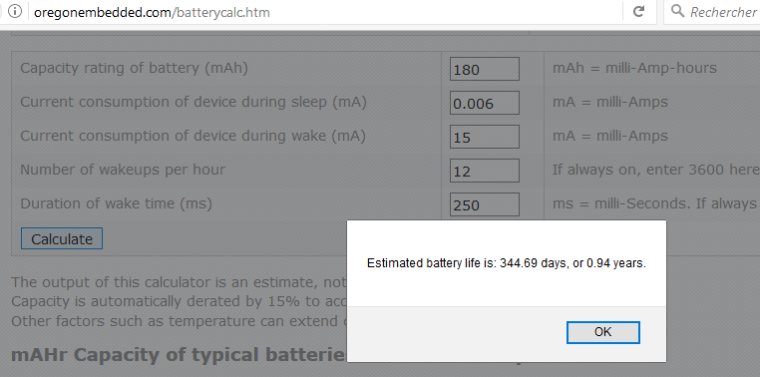
-
thanks for detailed explanation, I was always a bit skeptical towards those small batteries, but your module (and documentation) clears all doubts :)
Do you have any experience with OTA updates? I understand that it also needs custom boot-loader (sorry still not having enough understanding about all the things that are involved in making one node, a lot of new terms for me :) )
